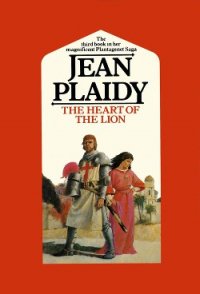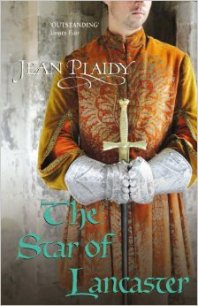The Follies of the King - Plaidy Jean (мир бесплатных книг .TXT) 📗
The Bruce back to his men. They surrounded him.
‘My lord, you could have been killed. This could have been the end.’
He looked rueful. ‘I have broken my battle-axe,’ he said, ‘It was a good
one.’
Inwardly, he was exultant. He could imagine what effect this would have on the enemy and his own soldiers for that matter.
They would regard it as a good augury and when a small army faces a large
one, auguries are very welcome.
Douglas had witnessed the King’s adventure and, considering it extremely -
rash, decided that he would himself take action. He was not going to let
Randolph be entirely annihilated by Clifford’s men no matter what Bruce said.
If the King could act rashly an impulse so would Douglas. The King had risked his life for a gesture. Well Douglas was going to do all in his power to see that Randolph did not lose his.
He summoned his men and rode swiftly towards the castle where the
fighting between Randolph and Clifford was still going on, but as he approached he could scarcely believe his eyes for the ground was littered with the English dead and he could see that Randolph was not only holding his own, but winning the day.
‘Hold!’ cried Douglas. ‘We will not help him. To do so would be to take
from him the honour which is his.’
He was right, even as he stood there watching, the English cavalry— or at
least that which could get away? was galloping off with some Scots in pursuit.
It was like a miracle.
Randolph had driven off the proposed attack on Stirling.
‘God is smiling on us this day,’ said Douglas.
???????
Night fell on the camps. The English had been sobered by the death of de
Bohun and the defeat of the cavalry on the way to the castle, but not unduly so.
They outnumbered the Scots and the spirit of Great Edward marched with them.
On that Monday, the twenty-fourth of June of the year 1314, as dawn broke
the Scottish army heard Mass performed by Maurice, Abbot of Inchaffray.
Every man was on his knees. Edward, from afar saw this and remarked to
Robert de Umfraville, ‘Do you see? They are kneeling.’
Robert, Earl of Angus since the death of his father in 1307 and who had
fought against the Scots on many occasions and as Earl of Angus was regularly summoned to the Scottish parliaments, knew Scotsmen well and he answered.
‘Yes, my lord, they kneel. But to God, not to us. I tell you this, my lord, that army will either win the day or die on this battlefield.’
‘We must see that they die on the battlefield then, Angus.’
‘My lord,’ went on Angus, who had become anglicised and believed that the
alliance of Scotland with England would be advantageous to both countries and had therefore sworn fealty to the English crown, ‘I know the Scots. They will be great fighters but they lack the discipline of your army. If you feign to retreat beyond the encampment they will rush forward to attack and fall out of order.’
‘Make semblance of retreat!’ cried Edward. ‘Never.’
In his shining armour he felt supreme. He thought momentarily, I wish
Perrot could see me now.
He was going to win. He was going to confound them all, those who had
been critical of him and had sworn that he could never compare with his father.
He glowed with excitement as he sounded the call to charge
Gloucester and Hereford prepared to advance towards the right wing of the
Scots which was under Edward Bruce.
Gloucester muttered: ‘I shall go ahead of you, Hereford.’
Hereford retorted, ‘My lord Gloucester, that will be my place.’
‘You mistake me, my lord,’ cried Gloucester, ‘if you think I shall follow
where you lead.’
As they argued, the Scots advanced and Gloucester with a small company of
men rode forward. It was folly for they found themselves surrounded by Scots and without sufficient support to withstand them. Thus the wrangle had put both Gloucester and Hereford at an initial disadvantage.
The battle had begun.
The English should have had the advantage. Their cavalry was magnificent,
but the Scots employed the custom of the schiltrom which was a formation like a hedge with each man holding his twelve-foot spear before him, so that even the heaviest cavalry must hesitate before throwing itself against those
formidable spears.
The archers provided the worst hazard for the Scots and even the schiltrom could not withstand those showers of deadly arrows which kept falling and
decimating them. The Scots however carried battle-axes beside their arrows which meant that when they had exhausted their supply of arrows they could rush forth with their axes and wreak havoc.
The hours passed and the battle raged. Bruce’s spirits were high. Luck was on his side. He had chosen the right place in which to fight and he was on his home land. The English were exhausted by their journey north; they were not in their native land. There was not a Scotsman who would not have died that day for Scotland for who knew what his fate would be if he fell into the hands of the English?
The sounds of battle were deafening. The knights shouted their war crimes
as they plunged into the fray and spear clanged against spear in the deadly conflict; arrows flying through the air pierced the horses’ flesh, driving the creatures to madden before they died, and the air was filled with the groans of the wounded and dying men; banners trailed on the ground among pennants and broken spears and the grass was spattered with the blood of Scots and English.
And still the battle persisted.
The Scottish army had in its wake the camp followers? men too old for
battle, women who wanted to be with their men, young children not of an age to fight but who were eager to see how the battle progressed and to be on the spot when the victory was complete, perhaps to take a share in what booty was
available. In any case they would not stay in their homes while Scotland’s future was being decided.
Bruce had ordered them to remain hidden by the hill and with them was the
army’s baggage and extra supplies of which they were in charge.
There was no doubt that the battle was going in Scotland’s favour.
Gloucester had been killed so had Sir Robert Clifford and Hereford had been taken prisoner.
The King’s bodyguards clustered round him and the Earl of Pembroke cried:
‘My lord, it is unwise for us to stay longer. We must leave the field without delay.’
‘I shall not desert my army,’ cried Edward fiercely.
But Pembroke took the bridle of the King’s horse and went on: ‘I am
responsible for your safety. My lord, consider what would happen to England if you were to fall into Bruce’s hands.’
‘Where my army has died so shall I if need be,’ replied Edward. .
‘Nobly said, my lord. But we must think of England without a King. Nay, if you will not come willingly then must I take you by force.’
The knights closed round the King. They agreed with Pembroke The battle
was lost, that was clear. The King was in danger. His only hope of survival was in flight.
Edward was desolate. Why should ill luck so dog hi,? Was there nothing he
could do which would succeed? If his father had been here?
No, no. It was no fault of his. Bruce was a genius just as Edward the First had been. None could stand against men like that. There was something
superhuman about them. They could not be judged by the standards of other
men and it was no use deploring the fact that one could not stand up to them.
He felt sick with disappointment.
The day had begun so gloriously. He had had everything on his side. But
Bruce was his enemy and men like Bruce, Wallace, his own father Edward,
were feared and respected; they had half-won their battles before they had started them.




